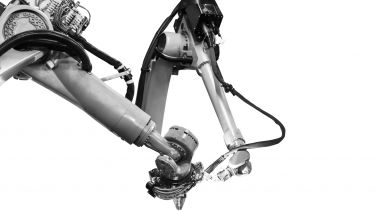Research and Innovation roundup 2023
A selection of research projects that capture our values and excellence as a University.

It has been another busy and successful year at Sheffield, and our dedicated and important research continues to impact lives in Sheffield, and beyond.
Among our research accomplishments, the last year has included the approval of a groundbreaking drug for a type of motor neurone disease for use in the US, the launch of our Centre for Machine Intelligence to transform AI-driven research, innovation and education, and being recognised as one of the best universities in the country for developing IP and commercialising research.
Our campus has also continued to grow with the opening of The Wave – our new state-of-the-art Social Sciences hub that’s not only our most sustainable building yet, but the first to operate at net-zero emissions.
I’m also incredibly proud of our flagship Energy Institute’s crucial role in the first transatlantic flight using 100% sustainable aviation fuel, which marks a significant milestone in decarbonising the aviation industry.
Sustainability is a core Sheffield value, in our research and across all faculties and disciplines, and I’m pleased to have this reflected in the 2024 QS World University Rankings: Sustainability, where we’ve been ranked 24th globally out of more than 1,400 institutions, as well as 7th in the UK and 12th in Europe.
The research impact we've seen this year is particularly impressive and I have chosen a handful of examples that showcase the breadth of the work we do. You can explore more here and I’m sure 2024 will bring even more opportunities for impactful research taking place at Sheffield.
Professor Sue Hartley
Vice-President for Research
Killing cancer cells with a Trojan horse
Every two minutes someone in the UK is diagnosed with cancer. Led by three female co-founders, the proposed venture has found a way to kill cancer cells while reducing stress on the immune system. Like a Trojan horse, the coatings hide the virus from the body.
Funded by Cancer Research UK and led by Dr Munnita Muthana from the Department of Oncology and Metabolism, an enterprising team at Sheffield are seeking to commercialise their research to bring about a non-invasive, kinder alternative to the standard of care for patients with cancer.
A new approach to cancer treatment
The power of language in a plastic waste crisis
Only 9 per cent of plastic in the UK is successfully recycled. With over half of UK households choosing to put one or more items in the general rubbish, researchers at Sheffield are taking a linguistic approach to change the nation’s throwaway culture.
Based on their research findings, the team developed a guide for every local council in the UK, as well as supermarkets and plastics manufacturers, to help construct effective messaging around plastic waste.
Making molecular research accessible across the world
Biophysics expert Dr Tim Craggs founded Exciting Instruments Ltd; a spinout with a focus on cheaper, user-friendly biology research tools. His solution is championing open research and making single molecule research and data analysis accessible to users worldwide.
The team from Sheffield designed and built a specialist microscope that users can tailor to their research needs. The instrument also hosts cloud-based data software that allows users to track the progress of an experiment on their phone in real time. It was created to help users move quickly from experiment to discovery without compromising on accuracy or requiring separate tools.
Protecting one of the most biodiverse regions on Earth
Colombia is one of the most biodiverse regions in the world and is home to 10 per cent of the planet’s species. But Colombia is also a hotspot for extinction and biodiversity loss because of climate and land-use changes.
Professor David Edwards led the PARAMO project funded by NERC, with facilitation from ColombiaBio, an organisation set up to coordinate research between universities and Colombian ministries, research institutes, and other stakeholders.
Protecting Colombia's biodiversity
Bridging cultures in mental health
Every year, one in four people will experience struggles with their mental health. Mental health is already a sensitive topic, but cultural and linguistic differences mean it isn’t as straightforward for everyone to receive the support they need.
Researchers from the School of Languages and Cultures are working to improve intercultural communication and understanding in healthcare. So far, the majority of participants have reported a growth in confidence in dealing with intercultural issues, asking questions and being inquisitive about topics they do not understand.
Enhancing the cultural competence of health and social professionals
Accelerating quantum technology worldwide
Companies across the globe are racing to make computers more powerful through next-generation technology. With two decades of research behind them, Aegiq is a spinout company enabling the move towards the second quantum revolution.
Preparing for the quantum future
Allocating scarce global health resources
According to the World Health Organisation, global spending on health reached £8.3 trillion or the equivalent of 10 per cent of global GDP between 2000 and 2018. But deciding which healthcare interventions to fund is a complex and often emotive question.
Our researchers have developed an algorithm to compare the value of treatments for different conditions. The Short Form 6 Dimension (SF-6D) measure informs global healthcare decisions that takes account of people’s preferences for different aspects of health.
An algorithm to inform global healthcare decisions
Transforming the efficiency of wind turbines
We’re leading a major collaboration between universities and energy companies that aims to reduce the UK’s reliance on fossil fuels by making offshore wind energy production more efficient, more reliable and cheaper to produce. Bringing research and industry together, the EPSRC Prosperity Partnership investigates the generators, blades, cables and foundations of wind turbines.
“As a result of all advancements and innovations, including those from this project, we estimate that the cost of energy from offshore wind farms is now one quarter of what it was in 2009” says Professor Zi-Qiang Zhu, from the Department of Electronic and Electrical Engineering.
Reducing roadworks with tiny robots
Across the UK, burst pipes and smaller hidden leaks in the pipe network lead to around 3 billion litres of water being wasted every single day. Professor Kirill Horoshenkov from the Faculty of Engineering is leading an interdisciplinary project that sends tiny robots into pipes to inspect and repair damage.
At a width of just 40mm, the robots are equipped with legs and cameras to explore the underground sewer network autonomously while using sensors to scan for faults. They are able to avoid restricted areas and collaborate together to scan and clear large areas.
Working with industry to prevent delays
Cancer research driven by patient needs
In Yorkshire, cancer is often diagnosed later than elsewhere in England. Following the successful development of three cancer drugs by the University of Sheffield, our researchers are working to improve early diagnosis, as well as prevention and treatments in our region and beyond.
Our new multi-million pound cancer research strategy, developed alongside and supported by funding from the charity Yorkshire Cancer follows on from the success of three cancer drugs developed by our researchers.
Verbalising machine needs with data
Manufacturing companies strive for high productivity and minimal waste yet most failures are out of their control. But what if there was a way to give these machines a voice? Professor George Panoutsos makes complex machine data less of a problem and more of an opportunity.
The team from the Department of Automatic Control and Systems Engineering have revolutionised precision manufacturing by developing the Self Learning System. This system uses data to understand how machinery performs and expresses this in linguistic terms to predict possible defects in a user-friendly way.
Changing support practises for adults with experience of childhood trauma
‘The GP said it was a long time ago so I should get over it’. Disclosure is the act of informing others about the experience of a traumatic event. Research by Dr Claire Cunnington, a research associate from the Department of Sociological studies, explores the impact that a negative response such as being shut down or ignored can have on recovery.
Her findings into the long term recovery process, and the impact of harmful responses to disclosure of child sexual abuse (CSA), are at the centre of a co-produced film that is supporting health professionals across the globe. Inspired by interviews from Claire’s research, the film sparks debate about how we, as a society, hinder the disclosure of CSA.












